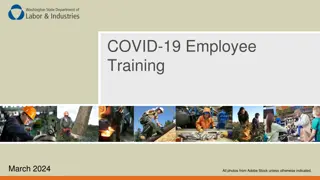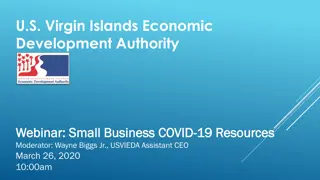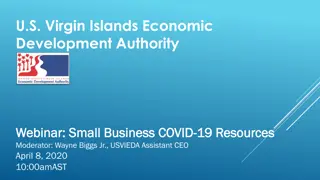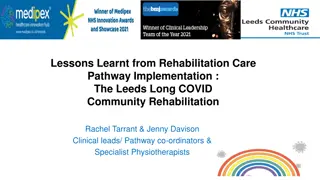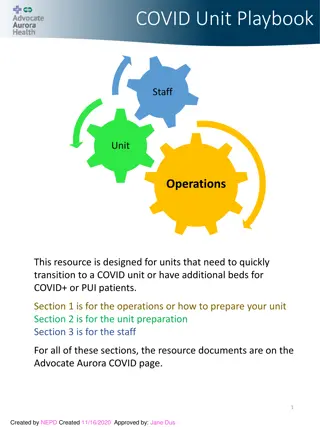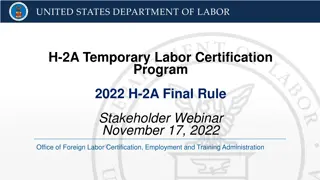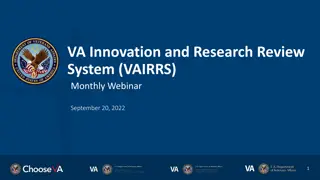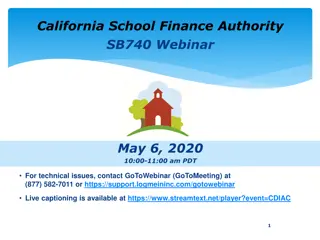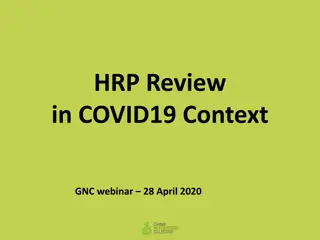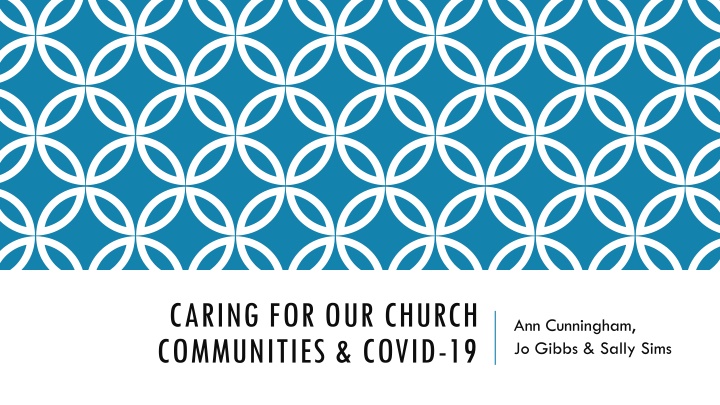
Caring for Church Communities during COVID-19
Learn about Christian care, responsible caregiving, pastoral care, elements of good care, and strategies for supporting churches during the COVID-19 pandemic. Discover the importance of structure, training, and support in providing appropriate care, both practically and prayerfully.
Download Presentation

Please find below an Image/Link to download the presentation.
The content on the website is provided AS IS for your information and personal use only. It may not be sold, licensed, or shared on other websites without obtaining consent from the author. If you encounter any issues during the download, it is possible that the publisher has removed the file from their server.
You are allowed to download the files provided on this website for personal or commercial use, subject to the condition that they are used lawfully. All files are the property of their respective owners.
The content on the website is provided AS IS for your information and personal use only. It may not be sold, licensed, or shared on other websites without obtaining consent from the author.
E N D
Presentation Transcript
CARING FOR OUR CHURCH COMMUNITIES & COVID-19 Ann Cunningham, Jo Gibbs & Sally Sims
WHAT IS CHRISTIAN CARE? Christ at the centre he is the why and how of our love Discipleship framework in the midst of suffering Strengthening a person s relationship with Jesus 3 P s Pastoral, Practical & Prayerful 1. Pastoral emotional and spiritual care, listening and empathy 2. Practical specific to each situation 3. Prayerful prayerfully dependent on God, praying with and for people
WHO IS RESPONSIBLE FOR CARE? HAS THIS CHANGED? Not changed just in the forefront of people s minds All Christians responsible for care and concern of those around us However, we all have different roles and levels of responsibilities Having a structure to meet peoples needs based on the level of complexity is crucial at a time like this
Professional Care Ministry Staff + Care Minister Ministry Leaders + Care Teams General Care + Care Teams
PASTORAL CARE In summary - All involved in pastoral care to some degree Need structures to ensure appropriate care is given by competent and skilled people as level of complexity increases Important to ensure training and support for pastoral care is provided One source of support for pastoral care workers is Sydney Christian Care Network closed Facebook page
ELEMENTS OF GOOD CARE Be proactive as well as reactive; equip people Be prayerfully dependent upon God Reach out by phone, listen well! Pray with one another and bring God s Word Practice safe ministry and know when and how to refer Prayerfully reflect the love of God in Christ Use and strengthen existing care structures Facilitate and coordinate care to build mutual concern
CARING FOR OUR CHURCHES DURING COVID-19 CONNECT: ENCOURAGE: encourage members spiritually SUPPORT: a. offer emotional support b. offer practical support EQUIP: train and equip for care help members to stay connected
CONNECT Small groups and ministry team to keep connected with members via regular phone calls, email, text and video meetings Staff and Care Ministry to call those who are not in Small Groups and those who are vulnerable (eg. 70+) and need extra care Provide tech support for those who need help to connect with church online Post sermon notes and letters to those who do not have technology Online Guess Who s Coming to Dinner event
ENCOURAGE Online services, youth and kids ministry, weekly online Small Group meetings Pray and bring God s word during conversations on the phone 1 to 1 Bible reading via phone or online video Videos and podcasts on Church social media including devotional messages from Ministers mid-week
SUPPORT EMOTIONAL Offer regular emotional support via phone and other media as appropriate Buddy system in Growth Groups for group members and also leaders Online Refreshment Nights for Growth Group leaders to support them and identify more complex pastoral needs that arise Care minister or those responsible for care on call for complex needs Phone ministry guidelines including suggestions of open questions to ask Inform members who to contact if people need extra or crisis care, or have tested positive for COVID-19 List of counsellors/resources for leaders and staff
SUPPORT PRACTICAL Offer practical support as appropriate, adhering to COVID-19 health directives Shopping support and care packages (basic food and for Year 12s) Set up Church pantry Set up a specific discretionary fund for those in difficult financial circumstances Donations of shopping vouchers List of external providers of food and financial assistance Accommodation register emergency accommodation, shelters and low- budget accommodation particularly for those escaping domestic abuse
EQUIP Train and equip for care via Church communications and E- news Short videos and webinars via Zoom and social media on care skills, mental health, self-care etc Age specific care plans kids, youth, young adults
PHONE MINISTRY GUIDELINES Christ Church St Ives: Guidelines for Phone Ministry during COVID-19 Love must be sincere. Hate what is evil; cling to what is good. Be devoted to one another in love. Honour one another above yourselves. Never be lacking in zeal, but keep your spiritual fervour, serving the Lord. Be joyful in hope, patient in affliction, faithful in prayer. Share with the Lord s people who are in need. Practice hospitality. (Romans 12:9-13) During the COVID-19 outbreak, everyone has a role to play in reaching out to others with the love of Jesus. However, now that face-to-face contact has become more restricted, the majority of our care and support will need to take place over the phone. Here are some principles to bear in mind as you call others: 1. Make a list Make a list of people (18 years and over) who you plan to contact over the coming days, weeks and months. These may be members of your Growth Group; people at church you know or who you ve been asked to call; people in your networks or neighbours in your street. Be sensitive about the use of Face Time or video calls, and only use if you have asked the person first. 2. Call and check they are ok to talk Call and if you don t know the person well, say something like: Hi it s . here from Christ Church, St Ives/our Street, I m ringing to say hello and to see how you re going. Have I caught you at a good time? The person may not want to talk right now, in which case, let them know it s ok and ask if you can call them back some other time. If they would prefer not to receive any calls, say something like That s ok, no problem all. If you change your mind we d love to hear from you and help you if we can. Keep a note in your diary of when you called and when you plan to call again. If you ve been asked to call a number of people at church, follow up your calls with an email to the appropriate staff member, to let them know the type of help needed and where things were left but don t share personal or confidential details. Staff, please update Elvanto. 2. Be attentive, listen well and give people space to tell you how they re going In the first instance, listen well and let the person tell you how they re going. Resist the impulse to jump in or interrupt before they ve finished. In order to determine unmet needs and provide appropriate support, ask open questions (which don t require a yes or no response). Start with the current support they have, and progress to spiritual matters. 3. Listen for social, emotional, financial and spiritual needs. Respond with empathy, and offer prayer, spiritual encouragement and practical help as appropriate a. Social needs
CARING FOR THOSE OVER 70 Need to incorporate an age appropriate approach Need to be extra sensitive their world and options have shrunk dramatically Current situation can be overwhelming Practically Clear and simple communication Technology may be new and overwhelming include setting up online shopping/banking plus church Remember their style of worship e.g. prayer book/ formal liturgy Care packs & shopping & deliveries Pastorally Work out most appropriate way to connect handwritten card; phone; email Give them more time and space to respond Consider specific spiritual needs Take your time to work out what is the best plan for each individual
CARING FOR PEOPLE IN FINANCIAL DIFFICULTY Listen with empathy, provide prayer support and bring God s word Direct people to Centre Link (new Job seeker and Job Keeper payments) Government job search site Jobs Hub https:www.dese.gov.au Direct people to other agencies eg. Anglicare, Salvos, community and Church pantries Set up a specific Discretionary Fund? Provide information about confidential and free financial counseling services eg. Catholic Care; LifeLine; National Debt helpline Professional help for those who are at increased risk of self harm, substance abuse or DFV due to financial pressures
CARING FOR PEOPLE IN DOMESTIC ABUSE Good resources Anglicare Family and Domestic Violence Advisor Lynda Dunstan Know Domestic Abuse - Online training through Safe Ministry website Sydney Diocese Domestic Abuse Policy A number of factors may increase domestic abuse during this time increased stress, financial difficulties and social isolation Continue to provide support but be careful - potential of increased monitoring Continue to listen and believe if someone discloses abuse Include key contact numbers in your COVID-19 resources Phone support include a question What are you most worried about at the moment?
CARING FOR PEOPLE IN DOMESTIC ABUSE Training for Small Group leaders Get advice from experts in this area If the person is able to talk to you about what s happening: Check that they have access to basic food and supplies Help them set up a safety plan or safety bag Let them know leaving is considered essential travel under COVID-19 legislation Let them know police will come and enter the house if called Provide contact numbers for services
DOMESTIC ABUSE HELPLINES Call 000 if in immediate danger Domestic Violence Hotline - 1800 65 64 63 24/7 telephone crisis counselling and referral service for women 1800 RESPECT 24/7 confidential information, counselling and support service for domestic abuse NSW Link2home NSW Crisis Accommodation Phone Line 1800 152 152 Men s Line 1300 78 99 78 - telephone and online counselling service for men with emotional health and relationship concerns

